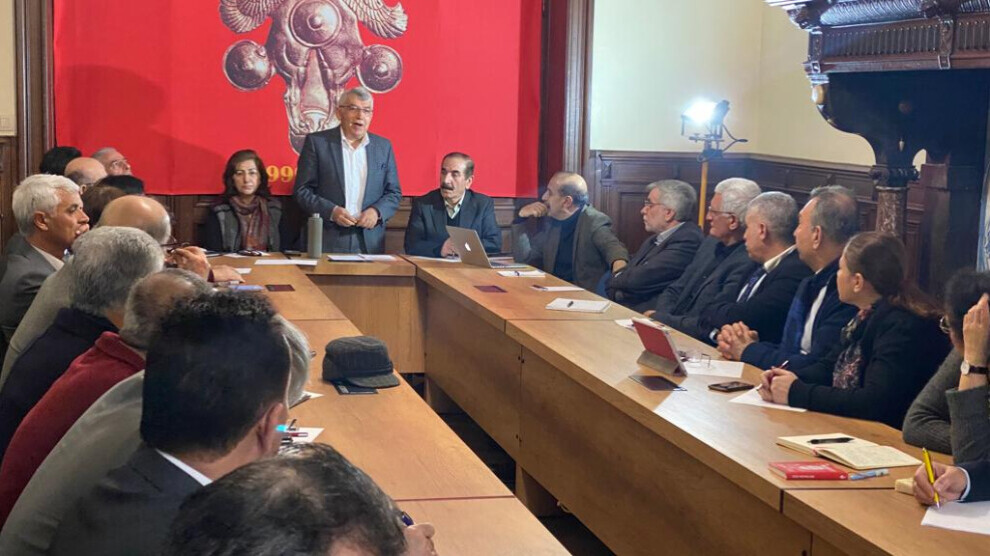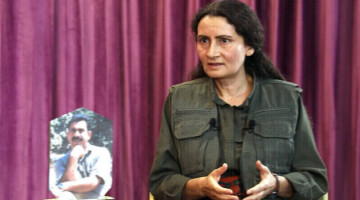Dozens of Kurdish party and institution representatives came together in Brussels to finalize the calendar of the actions they will organize on the 100th anniversary of the Treaty of Lausanne. Throughout 2023, the agreement will be protested with various events in many European cities starting with Lausanne.
The series of actions including conferences, panels, film screenings and concerts will start in February and continue until October. The final action will be a three-day trial.
'We will tell the world that we don’t recognize the Treaty of Lausanne'
The meeting took place at the Kurdistan National Congress (KNK). Co-chair of the KNK, Ahmet Karamus, said that 100 years have passed since the Treaty of Lausanne, “a treaty that has brought division, fragmentation, massacre and suffering to the Kurds in the past hundred years. Unfortunately, this situation continues today.”
Karamus added: “This treaty should be canceled. The Kurdish people must put up an all-out struggle. We have an obligation to fight together against this treaty. Our call to all parties and organizations is to meet on a common ground against this agreement.” Karamus underlined that it is necessary to tell the world that Kurds do not recognize the Treaty of Lausanne.
'Kurdistan is being de-Kurdishized'
Kurdistan National Congress (KNK) Co-chair Zeyneb Murad said: “A planned and strategic war is being waged against the Kurdish people. Unfortunately, we are not aware of this enough. Yes, the Sykes-Picot and Lausanne treaties divided Kurdistan. However, what is done today is much more dangerous and comprehensive. Today, the demographic structure of Kurdish cities is being changed. Kurdistan is being de-Kurdishized. We should be aware of that.”
'Kurds are strong but scattered'
Hikmet Serbilind, chair of the Kurdistan Islamic Party, pointed to the importance of unity among Kurds, saying: “On 23 December 2022, three Kurdish activists were killed in Paris. This was a big pain for all of us. However, if we do not come together around a common struggle, such massacres will spread. The Kurds are strong today, but we are scattered. We need to be united."
‘Only united can we win’
Nilüfer Koç, spokesperson of the KNK Foreign Relations Committee, said: “The political atmosphere today is very similar to that of 100 years ago. In the Middle East there is war. However, 100 years ago, the Kurds were divided and lost because they were not united. If we don't unite today, we will lose again.”
Koç said that the Turkish state is willing to risk everything to make the Kurds lose. “Turkey is committing all kinds of unlawfulness against the Kurds. It targets not only the Kurds, but everyone who supports them. Only united can we win.”
'Iran and Turkey want the continuation of Lausanne'
Siamend Mûînî, co-chair of the Kurdistan Free Life Party (PJAK), drew attention to the protests in Iran and said: “The basis of the oppressive policies towards the Kurds is the result of the Treaty of Lausanne. If this treaty did not exist, our people would not be in this situation. That is why today, states such as Iran and Turkey are making efforts to ensure the continuation of Lausanne.”
Kurdistan National Congress Executive Council member, Zübeyir Aydar, pointed out that the Turkish state has increased its attacks in Lausanne to achieve a definitive victory against the Kurdish guerrillas. “Just as Sri Lanka finished the Tamil Tigers in the last 10 years, the Turkish state also try to destroy the Kurdish guerrillas with the attacks it carried out throughout 2022. Turkey used all kinds of weapons to achieve its goal, including the use of chemical weapons. However, thousands of young people opposed these attacks with their resistance. It is necessary to carry out serious and comprehensive diplomatic work in Europe and America. In this century, we can draw the attention of world's public opinion to the Kurdish problem.”















